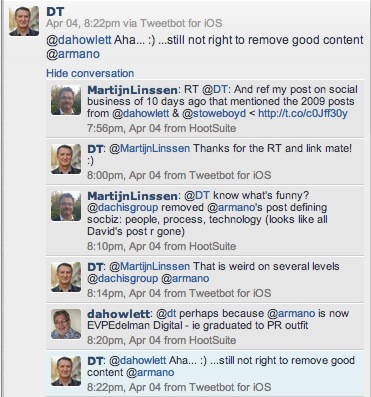Did Dachis Group slip on a banana skin of its own making?

A minor spat arose last evening over the whereabout of certain blog posts in Dachis Group's Collaboratory section of its website. The image below from my Tweetstream sets out the backdrop:
The ever observant Martijn Linssen asked: Is Dachis rewriting its own history? where he notes:
I clicked the link to David Armano's post Tweeting at the speed of scale on Dachis' Collaboraty, to find out it was a dead link. Odd
I then went to his reblog of that on his own blog, in which he points to the same link - gone to (of course). I made a remark about that:
@DT know what's funny? @dachisgroup removed @armano's post defining socbiz: people, process, technology (looks like all David's post r gone) — Martijn Linssen (@MartijnLinssen) April 4, 2012
and a discussion followed between Dave, me, and Dave Gray who pitched in, telling that nothing had been removed, according to what Peter Kim had just told him (on a different channel, apparently)
@MartijnLinssen @dt pretty sure Dachis did not have a blog when @armino left. @dachisgroup redesigned website, changed messaging, that's all — Dave Gray (@davegray) April 4, 2012
@DT that's what @peterkim just told me. No blog posts have been removed @martijnlinssen @armano @dachisgroup — Dave Gray (@davegray) April 4, 2012
There then follows some detective work on Linssen's part who found that not only were Armano's posts missing but so were those from Jevon MacDonald, another Dachis alum. Linssen concludes:
The only conclusion I can reach, is that all of Armano's and D[J]evon's posts have been removed from the Collaboratory. The only mitigation I can find for that, is that such a statement is not a strict matter of fact, because the website has been redesigned and "messaging has changed" as Dave Gray put it - meaning that Dachis must have forgotten to include David's and Jevon's posts while doing so
In an of itself you might think this was a minor problem but then it is not that many years ago that the blogs were full of 'experts' railing at others for deleting posts. What then followed became confusing. At first, Dachis Dave Gray was insistent that nothing had been deleted with the assumption that posts had got lost in a redesign:
I'm sure you are aware that links break occasionally. I assure you that to the best of my knowledge (as well as Pete's) any broken links are unintentional. Jevon and David are respected colleagues.
There then followed some back and forth before Peter Kim chimed in with:
I informed Dave incorrectly. As he mentioned, we were eating lunch and considering your tweets and post in passing, not performing any deep forensic online investigation. What's the big deal? If you want the content of the posts, you can most likely find them on David and Jevon's personal blogs.
Ever the fanatic for clear and unequivocal facts, Linssen noted that he had been misinformed to which Kim retorted:
I'm not sure what "rewriting history" means, but the explanation is simple. In 2009 we were a much smaller company and when an employee separated, we deleted all of their company IT accounts. Email, blog, Yammer, Basecamp, et al. The consequence was deletion of blog posts, so you won't find posts from David, Jevon, or Oliver.
You seem to imply that we are trying to erase the fact that these people worked at our company. Not at all, as Dave Gray clarifies above. "Omission" is absolutely your description and no one else's.
How big a deal is this? Earlier today I was having a conversation with colleagues where we discussed the disconnects between brand values as expressed in public statements and what goes on behind the scenes. Marketers today recognise the necessity for companies to create a unified experience from website through business processes to the end customer. During today's conversation, I mentioned the BA debacle which I reported upon last weekend as an example of how these disconnects, which often include process issues, have a powerful and negative impact. We see them repeated many times over.
On the Dachis Group site, Christoph Schmaltz recently wrote a piece entitled: Managing alumni relations in a connected world where he says:
Companies need to think of alumni as employees that never really left.
He then sets out a thoughtful model of engagement with alumni that makes a lot of sense and helps preserve value. Yet Kim says past employees (in the 2009 era) have all but been eliminated from the company's records. How do you square that apparent disconnect?
I was more concerned that any company might delete all accounts of a past employee. Where are the archives? What if something that employee did comes back to bite the company? Where is the history? How might the company successfully defend itself? Is that the kind of advice one should be taking?
We all make mistakes and the person who claims otherwise is a fool. But when it comes to brand, people and process alignment, the smallest things can catch us out in embarrassing ways. Heck, it's happened to me enough times. Those who advise on these topics need to be especially mindful. I am not convinced that brushing something off as a non-event in the public domain without thinking through the implications is helpful. In today's hyper connected and competitive environment, large brands absolutely cannot expect to get a free pass when something of this kind occurs. Advisors to those brands cannot expect different treatment.
